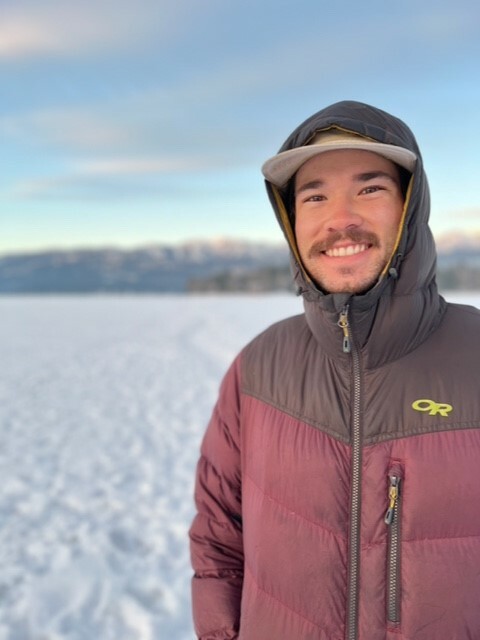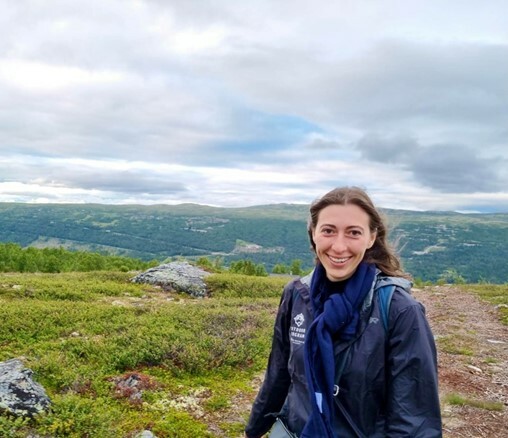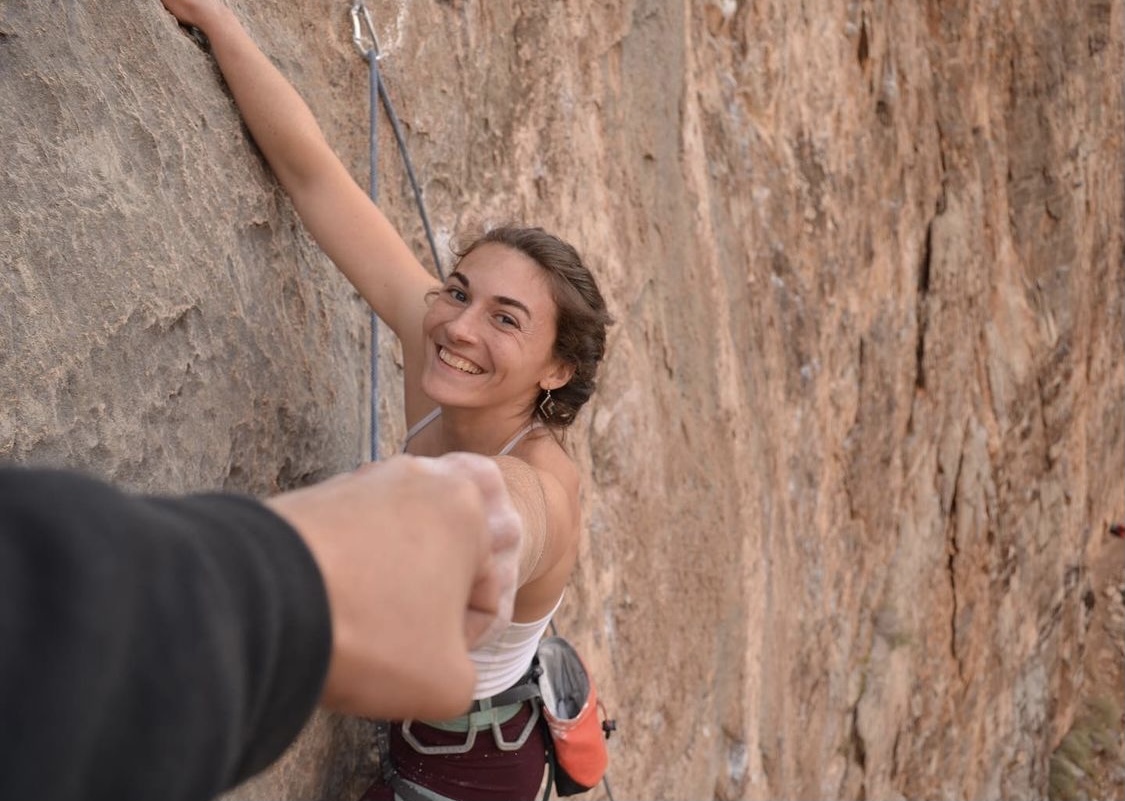NFF believes in the value of matching cutting-edge knowledge acquired in graduate-level studies with practical, hands-on experiences. The purpose of the Conservation Connect Fellowship is to align NFF's collaboration and conservation work with an experiential education opportunity. NFF strives to meet each fellow's learning objectives while also effectively delivering conservation results for National Forests and Grasslands through collaboration. The NFF gives fellows the chance to gain direct experience in a variety of NFF and partner functions, specifically in collaborative processes and stakeholder engagement. The Conservation Connect Fellowship aims to build experience, knowledge, and skills to guide the next generation of collaborative leaders in the field of conservation.
Let's meet the 2023 cohort of Conservation Connect Fellows!
Jake Barker

Jake Barker is a Master of Forestry candidate (‘24) at the Yale School of the Environment, exploring western forest management and restoration. Prior to YSE, he worked in sustainable forestry in the Pacific Northwest and as a forestry technician for the USDA Forest Service Enterprise Program. At Yale, he is focusing on public forest management and conservation. He is honored to be joining the NFF’s Rocky Mountain team for the summer, collaborating on sustainable recreation in the mountains of his home state of Colorado. Beyond work and school, Jake enjoys reading, splitboarding, and spending time with his partner and family.
Nerissa Barling

Growing up in Hawai'i exploring tidepools, Nerissa's curiosity about ahupua'a, and local watersheds, propelled her interest in stakeholder and enquiry-driven science. In high school, she conducted water quality investigations and worked with her community to restore estuaries and loko i'a, Hawaiian fishpond. Moving to Colorado for her undergraduate education, the incredible landscape inspired her to study geology. A summer undergraduate research experience in coastal biogeochemistry at the University of Hawai'i combined her geology and hydrology passions. As part of a larger effort to expand the Clean Water Act, she identified sources of nutrient pollution in groundwater across low-income coastline communities. This opportunity introduced Nerissa to research that informs policy and showed how her interest in the earth sciences could be applied to enact positive change, inspiring her to pursue graduate studies.
After earning a bachelor’s degree in geology from Colorado College, Nerissa is now a graduate student at the University of California, Santa Cruz, in the Watershed Hydrology lab. She investigates how the physical structure of the subsurface controls water storage, plant-water supply, and streamflow generation in our changing climate. As an NFF fellow, Nerissa will be working with the Partnerships on Every Forest Program and looks forward to engaging with diverse stakeholders to help develop partnership strategies.
Nathan Boyer-Rechlin

Nathan grew up exploring the lakes and forests of the Adirondack Park in northeastern New York State. Having been raised half a mile down a dirt road, surrounded by seemingly endless state-managed wild forest, it took a while for him to understand that not everyone’s backyard included thousands of acres of public land. Nathan has since ventured far from his Adirondack roots. He completed his bachelor’s degree in conservation biology at Principia College in southern Illinois, and has since lived and worked in New York State, Nepal, Colorado, Washington State, and Utah, before landing semi-permanently in Colorado in 2015. However, the value of wild spaces and public lands, instilled in him as an Adirondacker, remain a guiding force and have manifested in his unwillingness to live less than 10 miles from a trailhead. Being active in wild spaces has always been the foundation of Nathan’s conservation ethic, and he loves getting deep in the backcountry by foot, on his skis, or in his kayak.
Before returning to school to pursue his master's degree, Nathan completed research in land use and water quality in headwater streams, worked as a field tech for aquatic sciences projects, and spent four years at Walking Mountains Science Center near Vail, CO, as the Community Outreach Coordinator, running interpretive adult education programs, guiding hikes, and promoting citizen science opportunities in the community. Through this winding professional journey, Nathan started to see gaps between his work in science and community education and the "boots on the ground" conservation policy needed to protect ecosystems and preserve our natural resources. This desire to be involved in helping achieve resilient conservation policy has led him to University of Colorado, Boulder, where he is pursuing a master's degree in Environmental and Natural Resources Policy in the Masters of the Environment Program. Nathan is excited to gain a deeper understanding of how collaborative conservation initiatives are built through his work in the Diversifying Partnerships through Contracting practicum.
Nathan Bush

Nathan is a graduate student at Montana State University pursuing an MS degree in Applied Economics. He earned his bachelor’s degree at the University of Idaho where he studied economics, statistics, and the optimal balance of time spent between the library and in ski boots. Before beginning graduate school, Nathan spent several seasons in Whitefish, MT, as a competitive freestyle ski coach and backcountry forestry technician in the Bob Marshall Wilderness. He also completed an AmeriCorps program with the Montana Conversation Corps and volunteered with Citizens Climate Lobby Flathead Valley. In these roles, he discovered the immense sense of satisfaction that comes from taking care of and contributing to one's community. As a Conservation Connect Fellow, Nathan hopes to use the problem-solving tools and resource valuation methods of economics to help preserve and sustain the natural capital of our National Forests. He is excited to work with passionate conservationists from a diverse array of academic and professional backgrounds. Whenever possible, he can be found enjoying any number of outdoor activities or listening to early 2000s hip-hop.
Sophie Daudon
Sophie is pursuing a dual degree in public policy and environmental science at the University of Michigan. Born and raised in Seattle, Sophie grew up exploring the Cascade Mountains of Washington State. Her resulting passion for the natural world led her to major in environmental studies at Carleton College. Post-college, she did a Fulbright in Greece studying a “back to the land” movement spurred by the country’s economic crisis. Motivated by a desire to inspire in students an appreciation for natural systems, she then taught high school science and outdoor education for over six years in Seattle and the Methow Valley, WA.
In graduate school, Sophie has focused on facilitation, conservation policy, and forest ecology to pivot into a career leading collaborative efforts at the nexus of local, state, and federal policy that increase rural and forest resiliency in the American West. She is thrilled to support US Forest Service collaborative processes in the Grand Mesa, Uncompahgre, and Gunnison National Forests this summer through her fellowship with NFF.
Sasha Figel

Sasha is currently pursuing a master’s degree in the Energy and Resources Group at the University of California, Berkeley. She studies how various groups value natural resources and how that information can be used to implement successful and cost-effective land and resource management practices. Prior to starting her master’s program, Sasha worked as an environmental consultant at Industrial Economics, Inc. assisting with natural resource damage assessments and restoration planning for federal, state, and Tribal clients on projects throughout the United States. Sasha holds a B.S. in Ecology and Evolutionary Biology and a B.A. in Environmental Science from Rice University. Through her work, Sasha hopes to promote equitable access to natural resources through the lens of ecological science. She is looking forward to supporting the development of a monitoring implementation guide for the Nantahala and Pisgah National Forests in North Carolina through the Conservation Connect Fellowship.
Katherine Gonzalez

Katherine grew up in small town North Carolina. Being in the middle of the state allowed for quick access to both the beaches in the east and the mountains in the west. Her parents instilled a love and respect for the outdoors early on; imagine the circle of life conversation between Mufasa and young Simba. Her favorite places to explore were public lands, and the idea of having protected, natural places for everyone to enjoy, for generations to come, inspired her. Years later, community college allowed Katherine the space to lay a strong foundation for her educational career. Time and space to grow and figure out her place in this world, without the student loans. She later graduated from North Carolina Central University, in 2018, with a B.S. in Environmental and Geospatial Science. The Geospatial part entailed making maps and displaying data in creative ways, to help people understand complex issues like environmental justice, climate change, and food insecurity. They say a picture is worth 1,000 words, but a good map can mean so much more, breaking through language into a universal visual understanding.
After college, the great outdoors is where Katherine wanted to be, so she worked with, and then for, the US Forest Service. AmeriCorps gave her the footing for two years in trails, and two years in wildland fire made her realize how much she missed making maps. She decided to her position and pursue a graduate degree in Geographic Information Systems (GIS). West Virginia University allows Katherine to focus on environmental issues and make maps for wildfires during the summer. She is very excited to work on watersheds and further care for the public lands that she knows and loves.
Anna LoPresti

Anna is a PhD student in the Ecology and Evolutionary Biology Department at the University of Colorado, Boulder. Originally from Tower Lakes, Illinois, Anna moved to New York City where she graduated from Columbia University with a B.A. in Sustainable Development. Interested in both the ecology and policy of a changing climate, she completed an interdisciplinary M.S. in Environmental Change and Management at the University of Oxford. There, her work focused on community-based climate adaptation strategies for coffee agroforestry. Working with land managers and local conservation organizations drew her toward participatory research and collaborative conservation. Prior to landing in Boulder, Anna worked as a Climate Assessment Specialist for the NOAA Integrated Sciences and Assessment Program in New York City, where she collaborated with city and state government agencies on their climate adaptation planning processes. Now in the second year of her PhD, her research at CU Boulder focuses on the impacts of wildfire on communities and ecosystems across the western United States and the use of prescribed fire to meet conservation and climate adaptation goals. For her NFF fellowship practicum project, she will be working with San Juan National Forest to evaluate the impact of prescribed fire on cultural and social values, and to integrate these values into fuels reduction planning.
Miriam Olvera

Miriam is a graduate candidate at her alma mater, Western Colorado University, where she is pursuing a master's degree in business administration with a focus on the outdoor industry. As a child of immigrant parents, Miriam quickly discerned the different ways in which cultures connect with and embrace nature, specifically between Mexican and Indigenous cultures. Having grown up in Longmont, Colorado, she had what felt like limitless opportunities to recreate and grow in awe of the beautiful Rockies.
Her experiences have driven her passion for communities and the environment, leading to her pursuit of a B.A. in Environment and Sustainability and her current role as program coordinator for the Multicultural Center at WCU. Miriam’s current and future endeavors include developing opportunities for marginalized and underrepresented communities to experience the outdoors through education, conservation, and recreation. When not on the mountain snowboarding with friends, Miriam enjoys long strolls with her Pyrenees, Polo, as well as playing the guitar and dancing to any fun tunes!
Tristan O'Mara

Tristan O’Mara is a PhD student working with the Quantitative Ecology Lab in the School of Forestry at Northern Arizona University (NAU). Tristan grew up in western Washington and received a dual degree from the University of Washington in Biology and Environmental Science and Terrestrial Resource Management with a focus in remote sensing and landscape ecology.
Her current dissertation work at NAU focuses on creating a strategic prioritization and restoration decision support toolkit for wildfire risk in woodland and forest ecosystems in Northern and Central Arizona. Tristan is also classifying decision support tools used in the western United States and using 3DEP LiDAR to help improve geospatial input layers for some of these decision support tools. Tristan will be working with NFF and the Watershed Research and Training Center in Northern California on a project to help advance and increase the usage of decision support systems in Northern California forests for mitigating wildfire risk.
Outside of graduate school, Tristan is a part time artist; she makes landscape pointillism drawings and jewelry. She enjoys spending her free time bouldering, biking, cooking, and having quality time with friends.
Zoey Walder-Hoge

Zoey Walder-Hoge is a PhD candidate in the Department of Anthropology and Geography at Colorado State University in Fort Collins. Her research focuses on US international development policies and climate change adaptations in Ethiopia. She's also interested in how conservation is practiced in the United States and in East Africa, along with relationships between the US Government and Tribal Nations. As an NFF Conservation Connect fellow, Zoey's looking forward to assisting NFF with its diversity, equity, and inclusion (DEI) efforts.
Zoey has a B.A. in History from Georgetown University. For her M.A., she conducted ethnographic research in Tigrai, Ethiopia, interviewing farmers to learn how they adapt to environmental change in high elevation, drylands environments. She has also worked on projects under NAGPRA for the Bureau of Land Management in New Mexico. Zoey grew up in Colorado, milking goats and taking care of donkeys. She enjoys drawing in nature, playing fiddle, and reading magical realism.
We thank the Exxon Mobil Foundation, the Watershed Research and Training Center, the US Forest Service, and Alaska Airlines for their generous support of the 2023 Conservation Connect Fellowship Program.
Cover photo by Ryan Gervickas.
--------
Bringing people together has always been a superpower of the NFF. But we can’t do it without our supporters, and that includes you. Please consider making an unrestricted gift today so we can provide the absolute best collaborative services tomorrow. Simply click here. We – and all our partners – thank you!

